(Video by Xinhua Reporter Guo Peiran)
Some 85,000 artifacts collected in over 40 years, including photos, hand-written letters, passage tickets to the United States, and art works dating back to the 19th century were stored there, the largest collection of Chinese Americans' history in the world.
NEW YORK, Feb. 29 (Xinhua) -- For many residents of New York City's Chinatown, 70 Mulberry Street is more than an ordinary five-story, red-brick building. In it are memories of generations of Chinese Americans and their efforts to integrate into American society.
Originally built as a school over 100 years ago and owned by the city, it housed various social organizations including a language training center, a dance center, a senior center, and a number of community groups where people got to know more of their neighbors. Inhabitants of Chinatown, previous or current, are no stranger to the location.
On the night of Jan. 23, two days before the Chinese New Year, a huge fire ripped through the building, burning out its top two floors while injuring one civilian and nine firefighters.
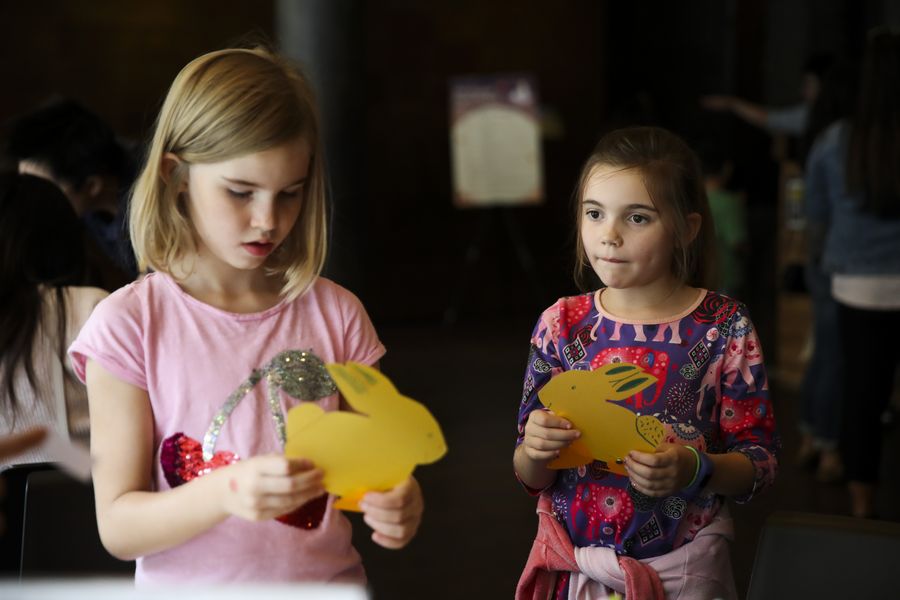
Children make paper puppets of Jade Rabbit during the Mid-Autumn Moon Family Festival event held at the Museum of Chinese in America (MOCA) in New York, the United States, Sept. 22, 2018. (Xinhua/Wang Ying)
Nancy Yao Maasbach, president of the Museum of Chinese in America (MOCA), was heartbroken. The building's second floor was where MOCA originally started as the Chinatown History Project in the 1980s, and was turned into its storage in 2009 after the exhibiting area moved to a nearby location.
"All of us were standing in the park across the street, just watching the fire, and then seeing water get placed onto the fire...It was devastating," she recalled the helpless moment in a recent interview with Xinhua.
Some 85,000 artifacts collected in over 40 years, including photos, hand-written letters, passage tickets to the United States, and art works dating back to the 19th century were stored there, the largest collection of Chinese Americans' history in the world. "I have never ever experienced so much inner heartache, and there's nothing you can (could) do," she said.

A man and his son make paper puppet of Jade Rabbit during the Mid-Autumn Moon Family Festival event held at the Museum of Chinese in America (MOCA) in New York, the United States, Sept. 22, 2018. (Xinhua/Wang Ying)
It took a whole night to put out the fire. To the surprise and relief of all, MOCA's storage turned out still intact. City workers, volunteers and MOCA staff relayed to retrieve the artifacts in the immediate aftermath of the fire. Around 20 percent of them were moved out during the first few days, but the remaining were trapped inside as some parts of the space were deemed unsafe to access.
The city said they had to wait. As several weeks passed by, Ms. Maasbach, who has been leading the MOCA for five years, couldn't sit still -- Many artifacts may be rotting inside due to the water. "The more we waited, the more anxious we became," she said.
That was when she realized that maybe they needed to be "a little bit clearer and louder," said the 48-year-old former investment banker. "Our history is not in textbooks. So why would anyone really naturally understand how important this is?"
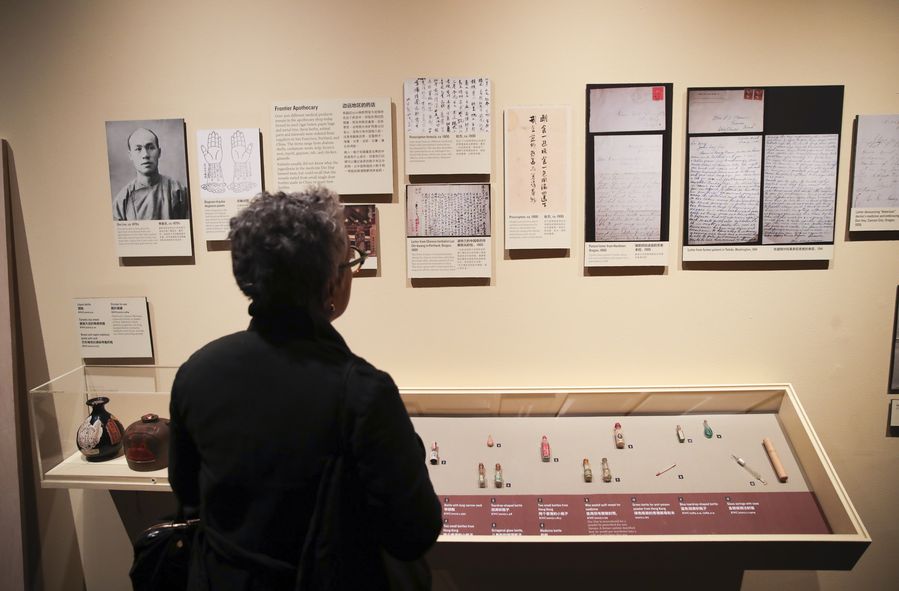
A journalist looks at exhibits during the press preview of Chinese Medicine in America: Converging Ideas, People and Practices and On the Shelves of Kam Wah Chung & Co. in the Museum of Chinese in America in New York, the United States, April 25, 2018. (Xinhua/Wang Ying)
The MOCA team then started to ask for opportunities to meet with various city agencies and planned for a march to make their voices heard. "We never wanted to be antagonistic or against the city. It's one of the largest metropolis with a lot of different groups working at different efforts. We just wanted to make it clear that we did everything we could to prioritize it and to be louder about it," said Ms. Maasbach.
Their efforts paid off. On Thursday, the NYC Department of Citywide Administrative Services (DCAS) issued a press release, announcing the plan to recover the remaining archives of the MOCA next week. It also began the first phase of deconstruction and rebuilding of 70 Mulberry Street on the same day.
"And they said: 'Originally we were thinking four months, but now we think we can get it in two weeks," said Ms. Maasbach, referring to her meeting with the DCAS earlier this week. "It was a blessing. We just couldn't believe it."
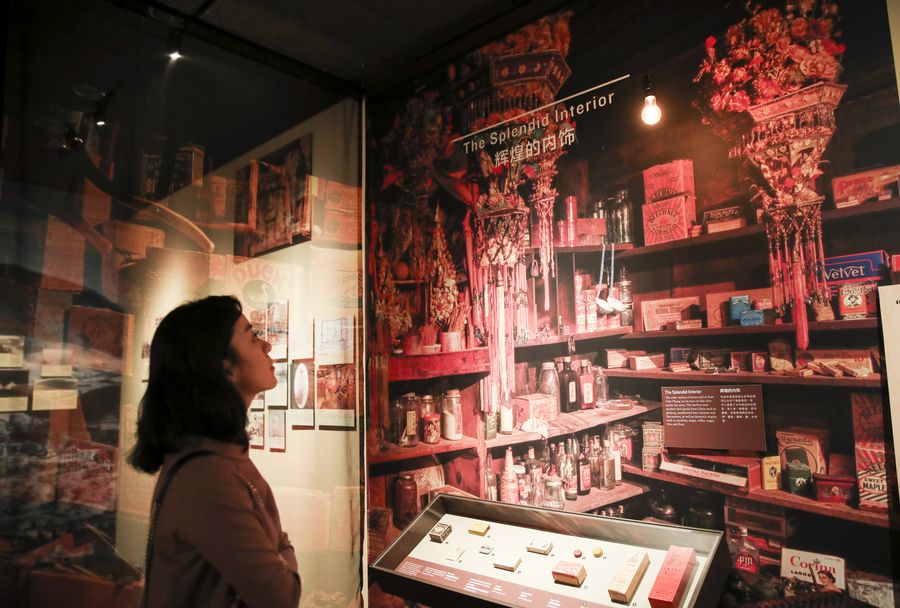
A journalist looks at exhibits during the press preview of Chinese Medicine in America: Converging Ideas, People and Practices and On the Shelves of Kam Wah Chung & Co. in the Museum of Chinese in America in New York, the United States, April 25, 2018. (Xinhua/Wang Ying)
New York Senator Chuck Schumer also issued a press release on Thursday, noting that "the contributions of Chinese-American immigrants to New York and the nation are inestimable and the Museum of Chinese in America is a precious repository of that history."
Schumer, who is also the Senate Minority Leader, urged the National Endowment for the Humanities to award an emergency grant to help the museum preserve its archives.
The wave of good news obviated the need for a consciousness raising march. Instead, the MOCA held a story-sharing event for New Yorkers who hold their common yet unique memories of MOCA and 70 Mulberry Street. "It's such a representative building for people who have been marginalized for too long in this country," she said.
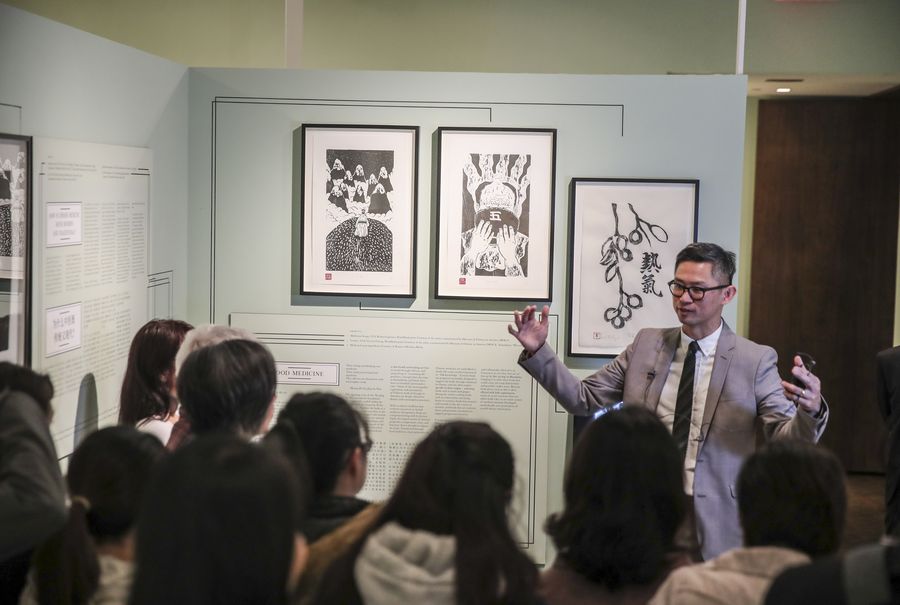
Herb Tam, Museum of Chinese in America (MOCA)'s Curator and Director of Exhibitions, introduces exhibits during the press preview of Chinese Medicine in America: Converging Ideas, People and Practices and On the Shelves of Kam Wah Chung & Co. in the Museum of Chinese in America in New York, the United States, April 25, 2018. (Xinhua/Wang Ying)
Dozens showed up Thursday morning in the museum's meeting room decorated with colorful self-created signs that read "Save Our Heritage!" "Our Stories Count" and "Our History Is Very Important" in English and Chinese, which were originally prepared for the march.
"Both sides of my family went to public school there. My grandmother graduated from there in the 1920s," said a Chinatown local whose surname is Chin. "The very first time I walked through those very impressive stairs, I got the chills because I felt like I could hear the footsteps of so many generations of my family members and their friends. "
Ms. Chin, who was wearing a T-shirt with her great grandmother's photo printed on the chest, said the MOCA archives served as a refuge for her because she was able to "see with my own eyes and touch with love a tangible part of my family history" there, including that photo.
"Thank you for continuing the efforts to get our stuff out," she said to a group of MOCA staff standing at the back of the room.
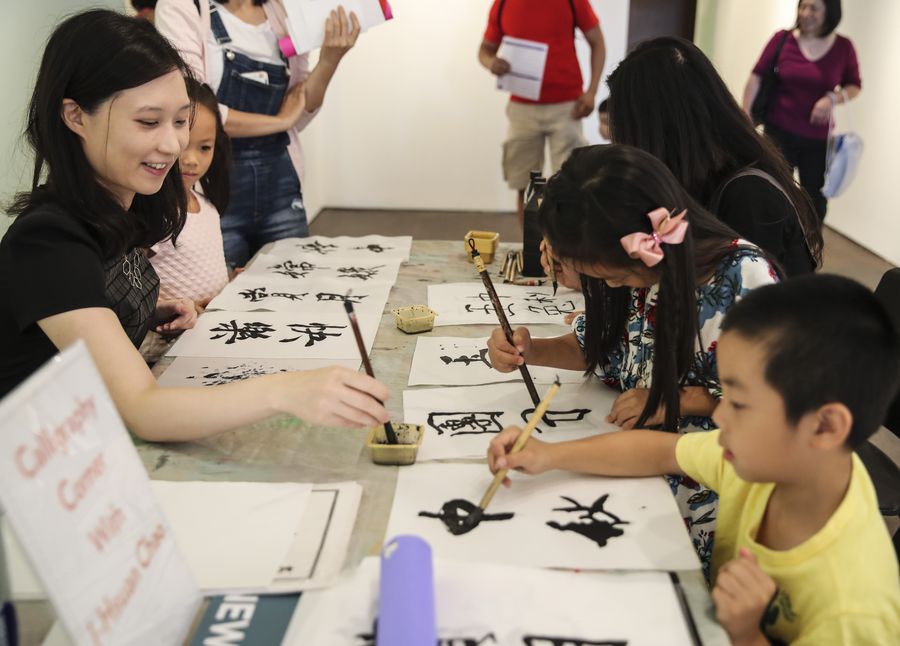
Children practice Chinese calligraphy during the Mid-Autumn Moon Family Festival event held at the Museum of Chinese in America (MOCA) in New York, the United States, Sept. 22, 2018. (Xinhua/Wang Ying)
Ms. Maasbach, who didn't grow up in Chinatown, always came here on the weekends with her mom when they just immigrated here decades ago. Her mom was learning English and typing inside the building so that she could find a job in their new life.
As a young girl at that time, Ms. Maasbach also felt empowered there because "people looked like me." The building is the center for her and her mother's confidence-building, a crucial element for newcomers, she noted.
A white woman who looks in her 60s said she took her adopted Chinese daughter to the MOCA's original location in the building when she was three and saw "some amazing exhibits. "
"She's now 24 and lives in San Francisco," said the lady in a sweet tone. "That building was just so amazing for us, to be able to access and see in real time exhibits that attached her as much as possible to her birth country. "
The fire was a bitter lesson for MOCA. Ms. Maasbach said the museum would do everything to guarantee the safety of its archives in the future.
But she also saw a silver lining. "What's come out of this tragedy is that no one will take our stories for granted anymore, ever again." ■



